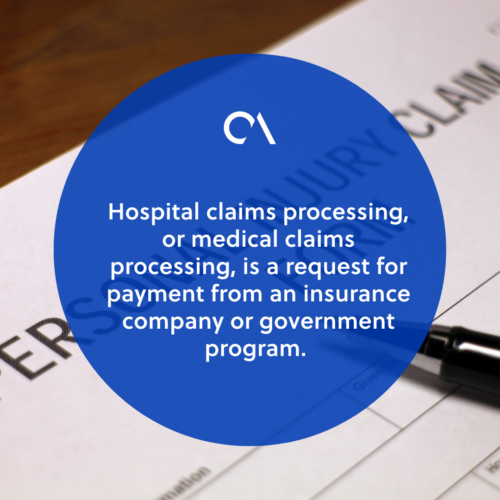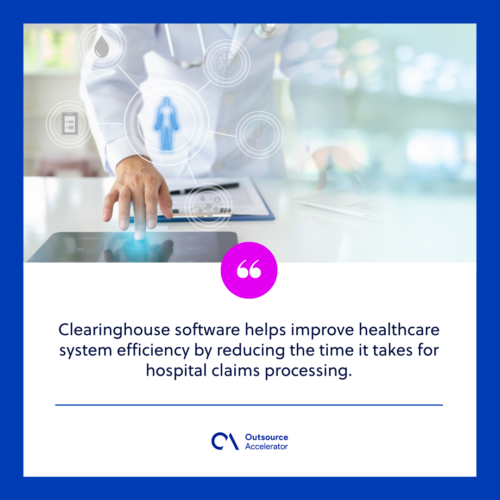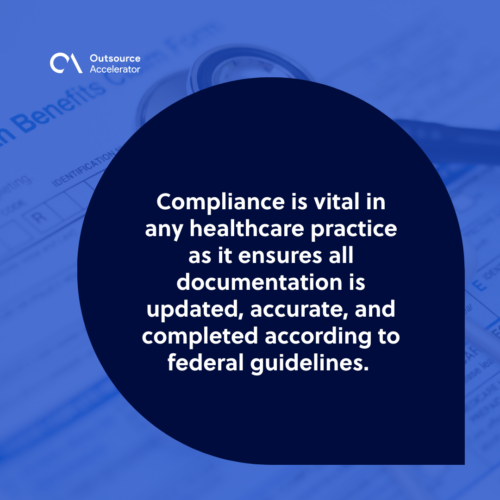The fundamentals of hospital claims processing

Insurance and medical care usually go hand in hand, but navigating the interweaving processes can be a headache for anyone who doesn’t do it professionally.
Hospital claims processing, like other processes in medical billing, can, fortunately, be outsourced. Outsourcing this task can free your business of the hassles of insurance and focus on what matters most – patient care.
What is a hospital claim?
Hospital claims processing, or medical claims processing, is a request for payment from an insurance company or government program.
The hospital sends a claim when a patient receives medical services, and the agencies pay the hospitals a partial or complete amount.
Hospital claims are a type of medical insurance claim. The patient or their healthcare provider can make these claims, but patients should know that submitting a claim doesn’t guarantee approval.
These claims cover charges for room and board, medical supplies and equipment, medication, procedures, and care-related services.
Hospital claims processing determines whether an insurance policy covers medical claims, what payment will be made, and how much of the patient’s care is covered by insurance.

What is a hospital claims processing clearinghouse?
A hospital claims processing clearinghouse is third-party software that acts as an intermediary between health insurance companies and medical providers. Clearinghouses help facilitate the processing of medical bills submitted by patients or providers.
Clearinghouse software helps improve healthcare system efficiency by reducing the time it takes for hospital claims processing.
The term “clearinghouse” refers to the clearance process. These companies receive medical claims from patients and healthcare providers, process them, then send them back to the appropriate parties.
Clearinghouses are not the same as outsourced hospital claims processing. The former is software, while the latter has a real person review your claim.
Still, the two are not mutually exclusive, and both resources can be utilized to increase the claim acceptance rate. A company that offers hospital claims processing can review your claim before sending it to a clearinghouse, then correct it if any errors are flagged.

How does hospital claims processing work?
Here is a quick summary of how the medical claims process works:
Claims adjudication
Claims adjudication is the process of reviewing hospital claims for accuracy and completeness. The term also refers to the department within an insurance company that handles hospital claims processing.
Explanation of benefits
Once a claim has been reviewed, the health insurance company sends an “explanation of benefits.” This summarizes how much money was paid and how much is left on the claim.
The explanation also includes any problems that may have occurred during adjudication. This can include information about deductibles, co-pays, or anything else related to your coverage.
Claims settlement
Finally, the insurance company pays the hospital the processed amount. It may be done individually per claim or in bulk over time.
Why outsource hospital claims processing?
Outsourcing hospital claims processing is becoming a viable alternative to in-house billing. Here are some of the most significant reasons for outsourcing hospital claims processing:
Increased accuracy
Hospitals often have difficulty keeping up with insurance companies’ codes per diagnosis, procedure, or test. Hospital claims processing outsourcing companies have years of experience handling these codes, ensuring accurate coding on every claim.
Outsourcing hospital claims processing makes sure your patients receive a high level of accuracy. These companies reduce medical coding errors with their developed systems and tools.
Faster processing
Hospital claims processing outsourcing companies can handle the entire process. This improves efficiency and reduces turnaround time on claims.
They are used to working with different types of claims and how to process them quickly. With the process sped up, you can focus on patient care.
Streamlined and efficient processing
No matter the size of your practice, outsourcing your hospital claims processing improves efficiency by letting you focus more on core areas of your patient care. It frees up valuable time that you can allocate elsewhere.
Companies that outsource hospital claims processing have a streamlined process and workforce to handle claims as quickly as possible. Within 48 hours of receiving the claims, they can be processed.
Automatic electronic workflow tools
Outsourcing hospital claims processing means you can access software programs designed for this purpose. These tools also help streamline the process and can be accessed from anywhere in the world due to their nature.
The best hospital claims processing providers developed their own automated workflow to process claims for thousands of providers daily. You can access these tools as well.
Guaranteed regulatory compliance
Compliance is vital in any healthcare practice as it ensures all documentation is updated, accurate, and completed according to federal guidelines. Outsourcing hospital claims processing takes over these tasks for you.
You need to know regulations like HIPAA and EMTALA. You’ll also require familiarity with medical coding and billing procedures, which are constantly changing.
You can rest assured your outsourced hospital claims processing company will comply with all regulations and submit requirements to appropriate parties within the correct time frame.

Reduce administrative duties
Outsourcing allows you to focus on your core business rather than spending time on administrative tasks like hospital claims processing.
Outsourcing companies also provide added support for documentation and coding paperwork. This frees up time for you to focus on generating revenue and providing excellent patient care.
Improved patient satisfaction
Patients are more satisfied when they have direct access to their hospital claims. They can check its status, ask questions, and find out what is happening.
This helps them feel more in control.
Patients with a good experience with your practice are more likely to refer you to friends and family members. This grows your practice and increases your bottom line.







 Independent
Independent




